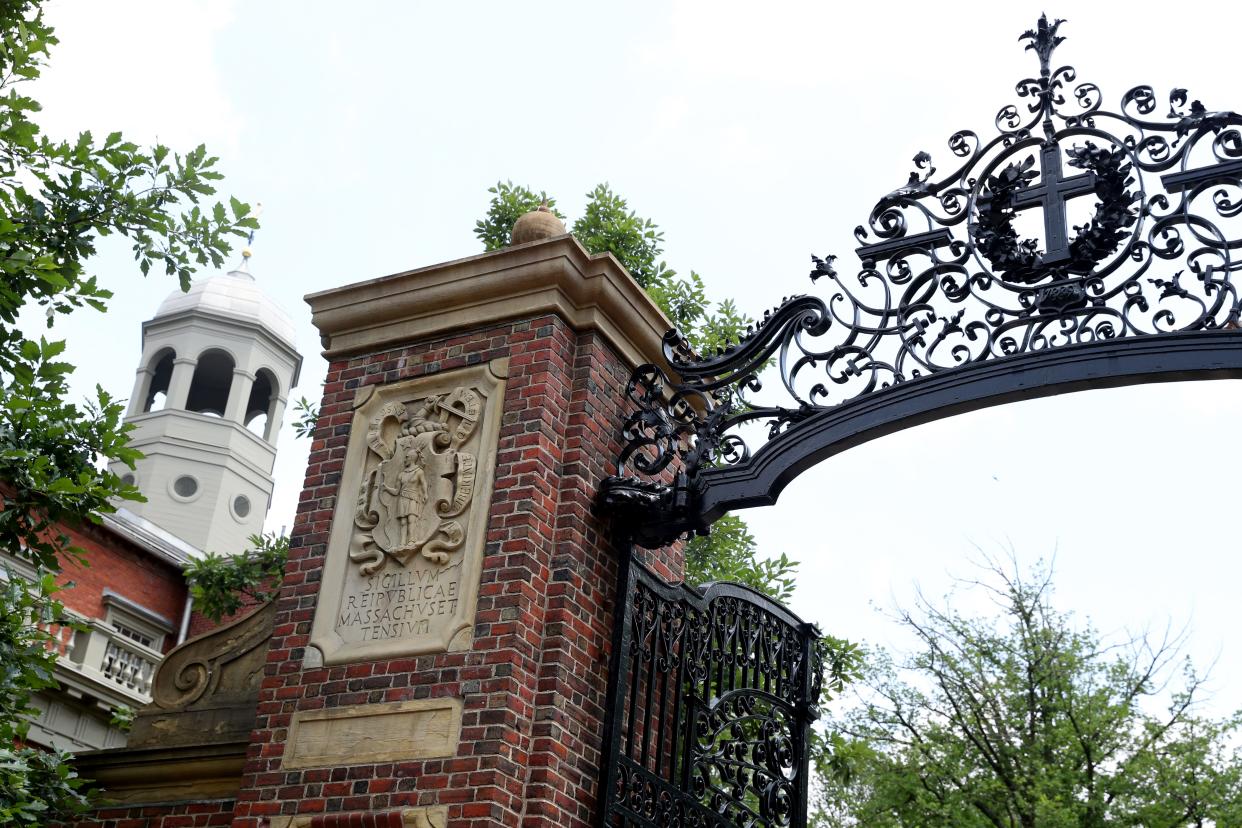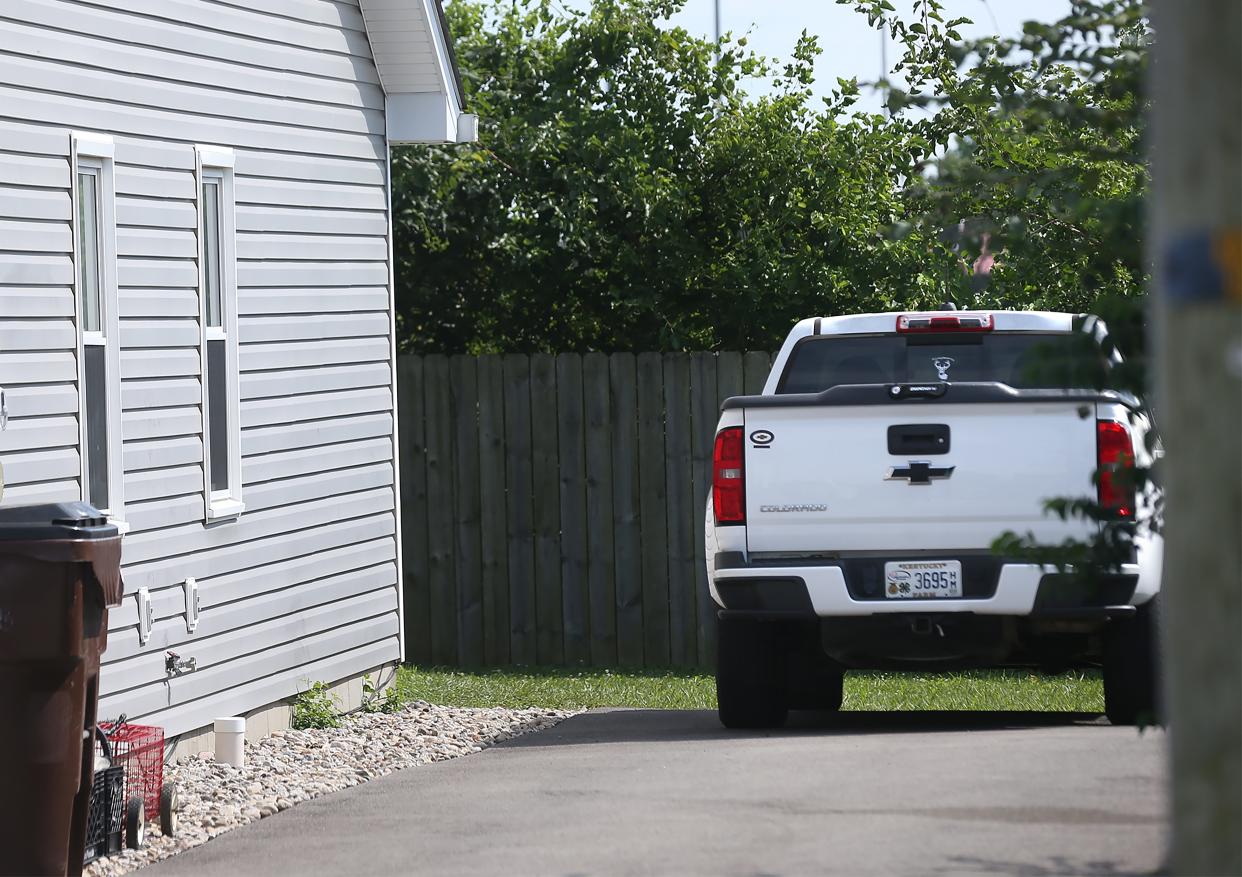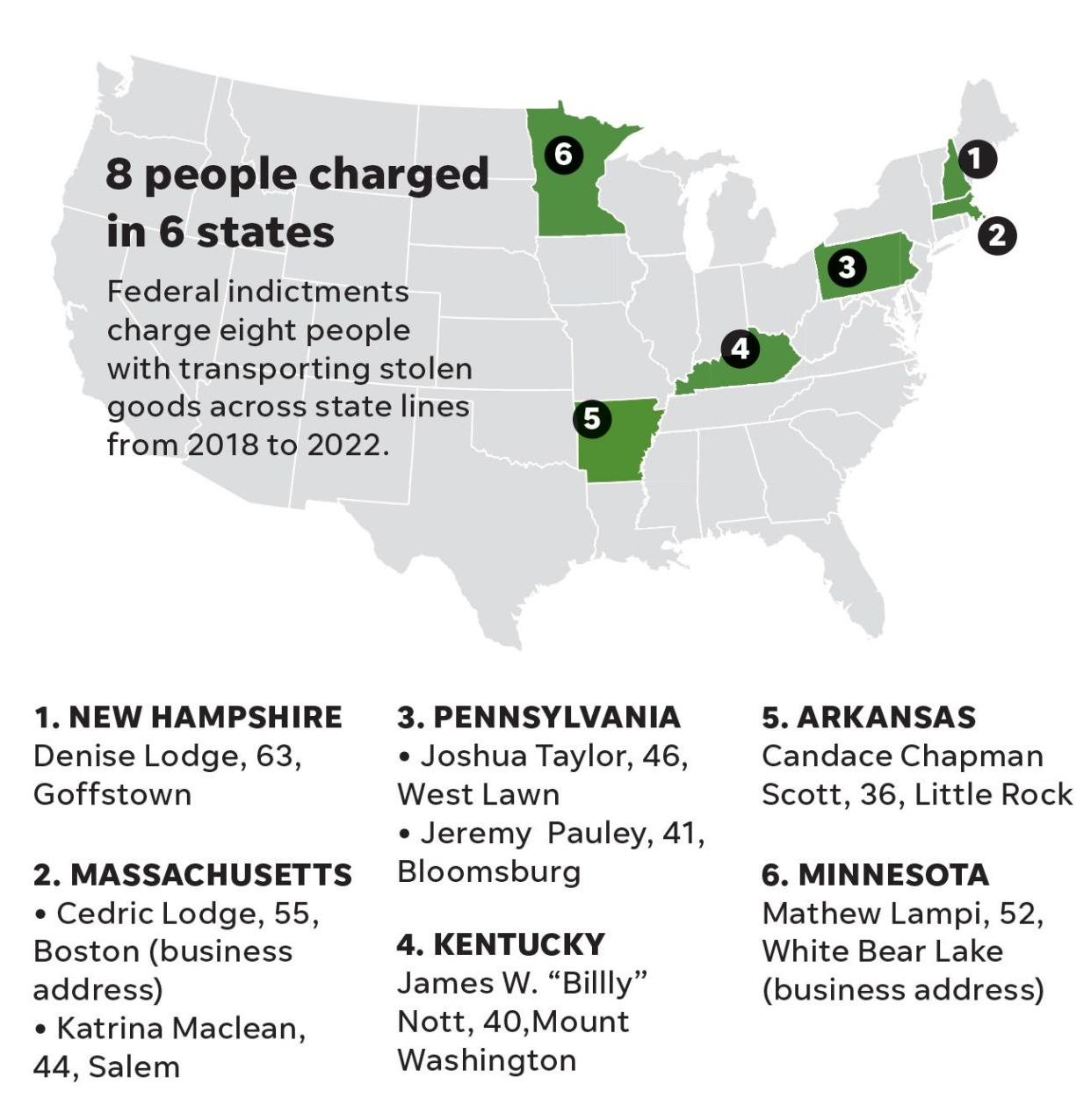Hearts, brains and bones: Stolen body parts scandal stretches from Harvard to Kentucky

This story contains graphic material that may be disturbing for some readers.
They bought and sold human hearts and lungs and livers and brains — not to mention skulls, spines, skin and fetuses. It was ghoulish and macabre.
But it also was profoundly sad for victims like a woman in Little Rock, Arkansas, identified in court papers only as D.S.
After she gave birth in February 2022 to a stillborn boy whom she had named Lux, a Little Rock funeral home delivered his body to Arkansas Central Mortuary Services for cremation. His ashes were supposed to be returned to her for burial.
Instead, according to court records, attendant Candace Chapman Scott, 36, sold the fetus for $300 to Jeremy Pauley, 41, a self-described body modification artist and human blood painter, who lived 1,062 miles away in Pennsylvania.
But that wasn’t the end of the line for Baby Lux. Pauley allegedly sent his body, plus $1,500, to Matthew Lampi, 52, a tattoo artist in White Bear Lake, Minnesota, in exchange for five human skulls.
Baby Lux's mother was later given remains of unknown origin.
Body parts from Harvard, Arkansas
The tawdry transactions are detailed in federal indictments charging eight people in six states, including Kentucky, with transporting stolen goods across state lines from 2018 to 2022. The defendants who have appeared in court have all pleaded not guilty.
The assortment of bones and organs came from cadavers donated to medical schools at Harvard University and the University of Arkansas for the training of doctors. Instead, according to the indictments, Scott and Cedric Lodge, 55, the mortuary manager at Harvard Medical School, broke them down for parts.
Law enforcement officials described the alleged trade in stolen human body parts as appalling.
“The theft and trafficking of human remains strikes at the very essence of what makes us human,” said Gerard M. Karam, the U.S. attorney for the Middle District of Pennsylvania. He said it was particularly egregious because so many of the victims had volunteered their bodies to be used to advance the interests of science, education and healing.
The defendants spoke about their goods in a matter-of-fact fashion.
“On or about Dec. 14, 2021," one of the indictments says, Pauley told Lampi, ”Going to pack up your brain and heart tonight; arm isn’t here yet but will send it out as soon as it arrives.”
In a Facebook message, Scott told Pauley, “I follow your page and work and LOVE it!
“Just out of curiosity,” she added. “Would you know anyone in the market for a fully intact embalmed brain?"
The scheme started in Boston, where Lodge fashioned himself as the Grim Reaper, according to a lawsuit filed July 13 against Harvard for failing to supervise him.
He drove to work each day in a Suburu with a vanity plate that read the “GRIM-R,” the suit says. And he posted a picture of himself on Facebook dressed in black hat and suit like a Victorian-era undertaker.
According to an indictment filed in Pennsylvania charging five of the defendants, he also let collectors into the morgue to select the parts they wanted. They included Katrina Maclean, of Salem, Massachusetts and Joshua Taylor, of West Lawn, Pennsylvania.
In October 2020, prosecutors said, she agreed to buy two dissected faces from Lodge for $600. They said she stored and sold remains at her store, Kat’s Creepy Creations, which advertised “creepy dolls, oddities” and “bone art” on Instagram.
The next year, in June or July, she shipped human skin to Pauley and hired him to tan it into "leather," according to an indictment, which says she paid him with more skin.

40 skulls found in Kentucky apartment
Lodge brought some of the remains to his home in New Hampshire, where he and his wife Denise allegedly sold them to co-defendants including Taylor, who is described in court papers as a middleman in the network.
Meanwhile, on Love Avenue in Mount Washington, Kentucky, James William “Billy” Nott, using the pseudonym of a 19th century Scottish serial killer, offered skulls for sale to Pauley and sent him a picture of one with the teeth still attached, according to a criminal complaint.
FBI agents knew Nott had previously been convicted of possession of grenade parts and a destructive device and descended on his home in full tactical gear, as if prepared for war.
When they got inside his apartment, they found 40 human skulls arrayed like decorations. When they asked if anyone else was home, he said, “Only my dead friends.”
Agents found spinal cords, femurs and hip bones inside, along with several AK-47s and a loaded revolver. Prosecutors charged him with possession of firearms by a prohibited person. He has not entered a plea and is being held in jail indefinitely.
Asked about her son, Joyce Nott, who lives in nearby Meade County, complained that news outlets had sensationally portrayed him as “freaky” while the story should be about mental illness” and the difficulty in obtaining treatment.
But she declined to say if he has been diagnosed with a mental disorder or sought treatment for one. His federal defender, Don Meier, did not respond to email messages.
In Little Rock, a judge has ordered a mental evaluation of Scott.

Amulets, talismans or trophies
But experts differ on whether collectors of human remains are necessarily unsound.
Michigan State University criminologist Karen Holt, who studies deviant behavior, said no one who has “meaningful and fulfilling relationships with other people is going to engage in this behavior. They probably lack interpersonal skills” and have “intimacy deficits."
“Body parts and corpses represent complete control for them,” she said.
But Dr. Neil Kaye, a forensic psychiatrist in Hockessin, Delaware, and a reviewer for the Department of Justice, said collecting human body parts may be a “weird behavior but it is not mental illness.”
He noted scientists, museums and churches have collected bones and other body parts for centuries.
Scholars say human bones are often kept by religious orders or family members as relics for veneration and remembrance and kept as amulets, talismans or trophies.
The fervor of museums to assemble so-called “bone rooms” also was fed by efforts to prove since discredited theories about intelligence and race.
When medical schools began to require anatomy courses, the only legal source of cadavers were the bodies of executed — so many resorted to buying bodies from grave robbers. Some medical students and doctors dug up the bodies themselves.
Eventually, led by UCLA in the 1950s, most medical schools launched anatomical gift programs. Some for-profit companies also have tried to cash in, including Science Care, which Reuters reported received at least 17,000 bodies between 2011 and 2015 and sold or leased more than 51,500 body parts. The company offers free pickup and cremation.
Buying and selling body parts is legal under federal law — as long as the parts aren’t from a Native American, according to Caitlin Doughty, author of “Will My Cat Eat My Eyeballs? And Other Questions About Dead Bodies.”
At least 38 states have laws that should prevent the sale of human remains, she writes. But in reality, the laws are “vague, confusing, and randomly enforced." Kentucky, for example, says a person is guilty of abuse of a corpse when he treats it ‘in a way that would outrage ordinary family sensibilities.”
The 'Memento Mori Museum'
Two of the defendants openly acknowledged for years that they bought and sold human parts.
Lampi, the Minnesota tattoo artist, was quoted in a 2008 British tattoo publication, Big Tattoo Planet, saying when he wasn’t tattooing, he collected “human skulls, a mortician’s make-up kit and a customer’s toe.”
Pauley described himself on his website as the “lead preservation specialist" of “retired medical specimens” for the “Pauley Institute of Preservation,” which he said allows "once forgotten specimens to re-enter the teaching realm” for both “private collectors and universities alike. “
He said on the site that he intended to found a new department dedicated to the tanning of human skin adorned with tattoos so families could keep it for the purpose of “mourning the dearly departed.”
Pauley also ran the “Memento Mori Museum” in Enola, Pennsylvania, about five miles from Harrisburg, (Memento Mori is Latin for “remember you must die.")
The museum has closed, according to the Cumberland County Chamber of Commerce.
Pauley did not respond to a letter asking him the names of universities or educators he has worked with.
But his girlfriend, Sophie Mae Vee, who also paints with human blood, said on her Facebook page that he operates a “legitimate, legal, business preserving human body parts."
“Jeremy’s devotion to unusual antiquities is as unconditional as his appearance,” she said.
Pauley has metal spikes embedded in his head and tattoos cover half his face; Vee said news outlets have used his mugshot as "clickbait."
Unpacking the human skeleton: Here's how many bones we have in our bodies.
Smokers’ lungs
The indictments describe a dizzying array of sales between Scott in Little Rock and Pauley, who now lives in Bloomsburg, Pennsylvania.
On Oct. 28, 2021, for example, Scott sent Pauley pictures of a heart and brains and asked him if $1,200 with shipping and “skull caps” included sounded reasonable.
“You are literally on the same page because that was going to be my offer lol,” he responded.
On Dec. 18, 2021, Scott asked Pauley — identified in the indictments as “Individual A” — if he would be interested in purchasing a fetus. He said he was and instructed her how to package it.
In their biggest transaction, she told him she had come into possession of a “half head, one whole head minus skullcap, three brains with skullcap, one heart, three livers, five lungs, two kidneys, one full pelvis female, one piece of skin with nipple and four hands." Scott agreed to part with them for $4,000.
Other items she sold him included genitalia, a trachea and two “smoker’s lungs.”
It all came to an end June 14, 2022, when investigators received a tip about suspicious activity at Pauley’s home, the East Pennsboro Township police said in a statement.
When Lampi heard the news in Minnesota, he contacted Pauley, who tried to assure him they would be okay.
“The only thing that matters was that nothing was proved ‘grave-robbed‘ or stolen out of a morgue,” he said.
But police and prosecutors say the parts were in fact stolen from two mortuaries.
While the defendants face criminal charges of conspiracy and interstate transport of stolen goods, the prestigious Harvard Medical School, founded in 1782 and the top medical school in the country by some rankings, faces at least three lawsuits filed by family members of people who donated their bodies to its anatomical gifts program.
As many as 400 cadavers have been plundered at Harvard.
The plaintiffs include Anne Weiss, whose father, Dr. William Buchanan, a pediatrician and graduate of the medical school, had arranged to gift his body to it before his death at age 90 in 2018.
Harvard said it doesn’t comment on pending litigation. But Weiss’s two Pennsylvania law firms — Sauder Schelkopf and Bochetto & Lentz — said in a statement that "this ghoulish black market was allowed to flourish in plain sight by an HMS employee whose lack of respect for the dead was obvious to anyone who scrutinized his behavior."
Harvard Medical School, the statement said, “failed Buchanan, his family, and everyone impacted by these horrific acts.”
For subscribers: Nazi diaries, forgers at the Vatican: How Delaware became a hotbed for solving art crime
Reporter Andrew Wolfson can be reached at (502) 396-5853 or awolfson@courier-journal.com.
This article originally appeared on Louisville Courier Journal: Stolen body parts scandal stretches from Harvard to Kentucky
